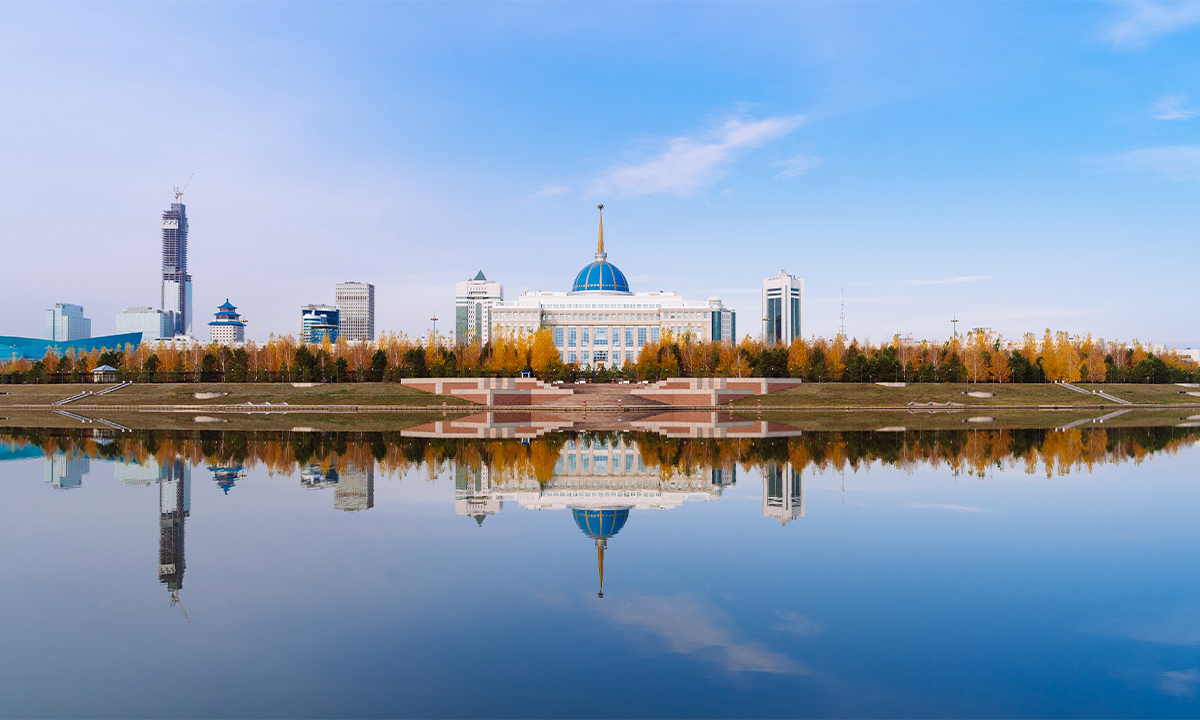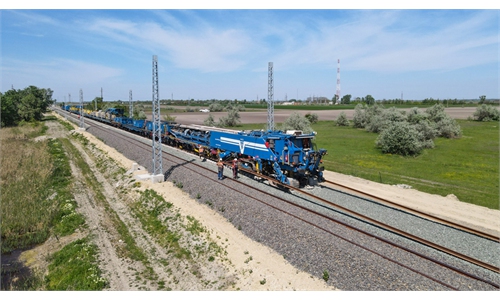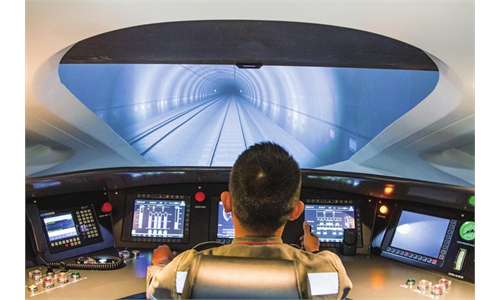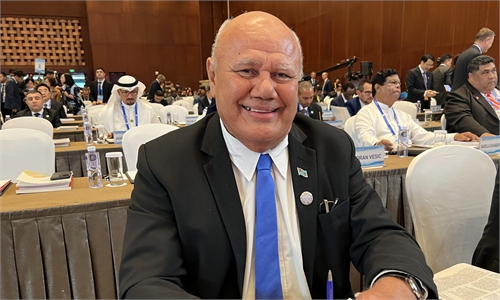China has been making significant contributions to SCO economic integration, promoting mutual trust with members: Kazakh scholar

A view of Astana, the capital city of Kazakhstan Photo: VCG
Editor's Note:
The 24th meeting of the Council of Heads of State of the Shanghai Cooperation Organisation (SCO) will take place in Astana, Kazakhstan in early July. Ahead of the SCO summit, Global Times reporters Li Xuanmin and Xing Xiaojing (GT) conducted an exclusive interview with Gulnar Shaimergenova (Shaimergenova), director of the China Studies Center in Kazakhstan, who during the interview highlighted the extensive role China plays in facilitating regional cooperation and economic integration. Shaimergenova was present when the concept of BRI was first put forward in Kazakhstan in 2013. During the interview, Shaimergenova shared her insights on how the initiative has opened up new opportunities of economic interaction and partnership, rising trade and prosperity in the region.
GT: The 24th meeting of the Council of Heads of State of the Shanghai Cooperation Organisation (SCO) will take place in Astana, Kazakhstan in early July. What are your expectations for the upcoming meeting? What development opportunities does the SCO present for Kazakhstan?
Shaimergenova: The new context of SCO development may stimulate the search for new approaches to the work of SCO. The SCO summit offers an opportunity to qualitatively influence the international agenda, and the organization needs to offer new concepts and attractive development ideas for a wide range of member states, observers, and participants in the dialogue.
If it effectively adapts to new realities in the future, the SCO could be offered with new impetus to be politically influential, economically powerful, largely self-sufficient, and it will display a new form of international cooperation.
The milestone of development in the past is a good reason for the leaders of SCO member countries to have a comprehensive discussion and begin more important works aimed at leveraging the enlarged potential of the organization.
This year, Kazakhstan's chairmanship in the SCO took place against the backdrop of growing geopolitical tensions, escalating challenges and threats of exacerbation of smoldering conflicts and the emergence of new conflicts.
In these conditions, Kazakhstan's proposals and initiatives on world unity as well as peace and harmony seem very timely. These are of decisive importance both for the organization and for the region itself, and provide an opportunity to develop cooperation, strengthen regional integration and solve emerging problems.
Constructive changes in the SCO should be reflected in its new positioning as a more effective organization: not only an increase in members, but also entering new areas of interaction with real projects. Economic issues will remain the area of special attention of the SCO in the coming years, especially taking into account the improvement of national economies and full-fledged cooperation among SCO members.
The SCO has significantly influenced Kazakhstan both in terms of regional security and economic development. As a founding member of the SCO, Kazakhstan actively engages with the organization to promote stability, cooperation and shared prosperity in Central Asia and beyond. In the field of regional security, the SCO has provided Kazakhstan with an important platform for addressing common security challenges, especially those related to terrorism, extremism and transnational crime.
Thanks to the SCO Regional Anti-Terrorism Structure, Kazakhstan was able to improve intelligence sharing and operational interaction with other members, which is contributing to a more effective fight against terrorism in the region.
GT: From your perspective, what kind of role China has played in the development of the SCO over the past decades?
Shaimergenova: China has made a significant contribution to the development of economic cooperation within the SCO. Initiatives such as the Belt and Road Initiative (BRI) have achieved synergies with the SCO agenda, promoting infrastructure development, as well as trade and investment flow across Eurasia. This integration not only stimulated economic growth, but also strengthened connectivity and stability in the region.
China's role in the SCO goes beyond those initiatives. The country proactively advocates cultural exchanges, international diplomacy and environmental cooperation within SCO, emphasizing the importance of soft power in building closer relations between different countries. By promoting dialogue and mutual understanding, China strives to build a cohesive regional community that overcomes geopolitical rivalries and promotes mutual trust.
GT: We noticed that you were there when Chinese leader put forward the concept of BRI in Kazakhstan in 2013. How did you feel at that time? What changes have you witnessed in Kazakhstan over the past 11 years since the China-proposed BRI was launched?
Shaimergenova: I remember well the inspiring speech of the Chinese leader during his visit to Kazakhstan. In his speech, Chinese leader addressed the deep and colorful history of the ancient Silk Road, which has already been discussed by people of many countries.
The Silk Road affected the larger history of my country -Kazakhstan, which, thanks to its geographic position, has always played a special role in interregional exchange on the continent. Then Chinese leader presented new prospects for possible development and proposed modern comprehensive cooperation based on the concept of the BRI. These ideas were fully supported by Kazakhstan leaders.
Today, more than 10 years after that speech, we can say that the China-proposed initiative is writing a new history of trade and economic interaction. We see that East and West have become closer economically; many partner countries have a chance for economic development. International trade, investment, technology exchange, modern industrial projects are noticeably expanding, and all participants receive benefits.
The BRI proposed by Chinese leader today opens up enormous opportunities for economic interaction, trade and increased prosperity among partner countries. The proposal has fully justified itself.
GT: Since the establishment of diplomatic relations in 1992, China and Kazakhstan have maintained close and friendly relations. From your perspective, what kind of exemplary role this has played in Central Asia?
Shaimergenova: The high level of relations between our countries indicates that China and Kazakhstan fully trust each other, develop mutually beneficial cooperation, and support the initiatives of both countries.
In 2019, China and Kazakhstan decided to develop a permanent comprehensive strategic partnership. I remember that there was a lot of discussion regarding the term "permanent." I think it means that China and Kazakhstan are good neighbors, therefore, both fate and geography destined us to interact.
The people of the two countries have been living side by side for several thousand years. This is all recorded in historical chronicles. And we strive to live as good neighbors for as long in the future. And "comprehensive" means that we are developing cooperation in the widest range of areas of life.
Over these years, our countries have achieved many cooperation results that go beyond bilateral interaction. If we look at the development of cooperation within the BRI framework, we can confidently say that China and Kazakhstan are setting trends in Eurasia.
And we will strive to maintain and develop this positive dynamic in our relations and live as good neighbors for many centuries to come and set an example for other countries in the region.




